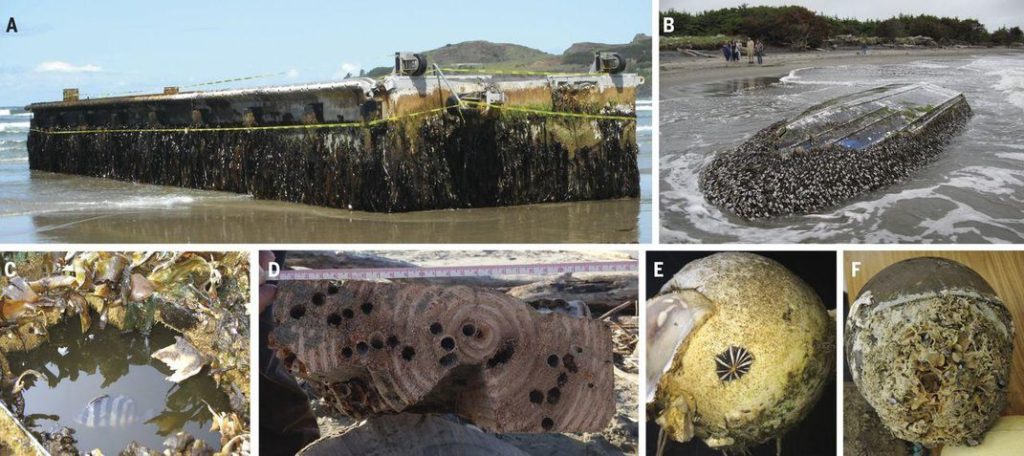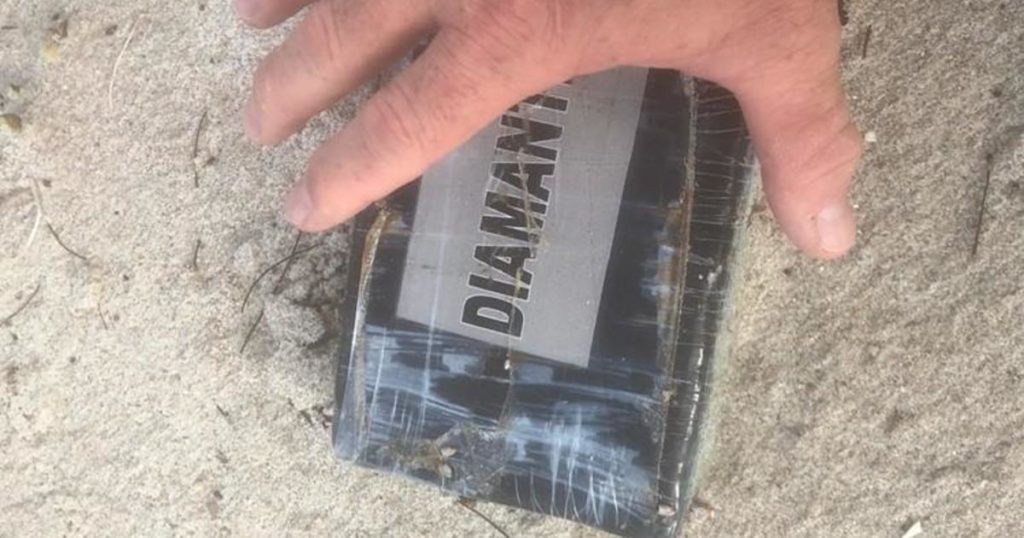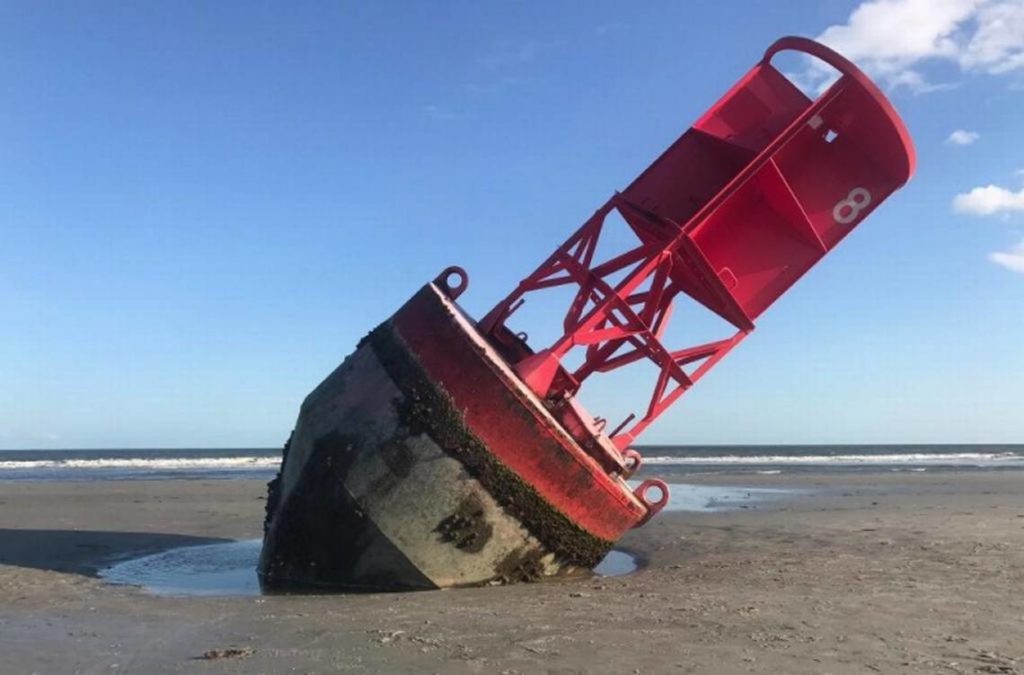We are here on the Blind Side, It’s hard to believe that any good could come from an earthquake-triggered tsunami responsible for significant loss of life, but after the dust had settled and people began to rebuild their lives, many objects considered long since missing, began turning up on several beaches, some many thousands of miles from home. From the Harley Davidson swept onto the Canadian coast to the tragic loss of a teenage rock band, here are 15 Strangest Things Discovered After Tsunamis.
15. A Harley-Davidson
Imagine losing your prize possession to the depths of the ocean floor. Well this was the reality for a Harley-Davidson owner, whose motorcycle was being transported in a storage container across the sea, at the very same time the massive earthquake-triggered tsunami hit Miyagi Prefecture and other parts of Japan’s north-eastern coast on March 11, 2011.
The bikes owner Ikuo Yokoyama survived the tsunami himself, however, he lost several members of his family and all his possessions. Believing his motorcycle to be lost at sea, he barely gave it another thought, instead concentrating on rebuilding his life.
Miraculously, just over a year later in April 2012, Canadian beachcomber Peter Mark made a surprising discovery, a large storage container, washed up on the coast of isolated Graham Island in British Colombia.
Having succumbed to the sea 13 months prior following the tsunami, the insulated container was holding a broken and rusted 2004 Harley-Davidson Night Train motorcycle with Japanese license plates.
The VIN number was still visible, and the bikes owner, Ikuo Yokoyama was notified.
The Harley-Davidson had survived a 4,000-plus mile journey across the Pacific and was finally home, abet slightly worse for wear.
Beyond repair, Harley-Davidson offered to replace it the bike, however, after the year his fellow countrymen had endured, Ikuo didn’t feel right accepting the generous gift, instead gifting his ruined bike to a museum. It stands today, in remembrance of the 2011 tragedy, that claimed over 15,000 lives and changed the lives of those who survived it, forever.
Now it’s time for the Star Topic
If you’ve ever watched the movie ‘Ghost Ship’ or seen episodes of Sponge Bob, where we are introduced to ‘The Flying Dutchman’ and his eerily similar transportation, then this image will bring the memories flooding back. Unlike these two fictional examples, however, an actual giant ghost ship is said to have been swept into shore following a tsunami. Although, the image is simply a depiction of the events that unfolded, the story goes, that a young girl was playing on the beach one day, when a giant ship came into view.

Covered in barnacles and rust, the heavily damaged ship resembled one that had disappeared many years before, under mysterious circumstances, never to be seen again. It’s certainly a possibility that a tsunami may have dredged the ship up from the sea floor, but when tales of the ship’s appearance were told, and the beach inspected, the skeletal remains were nowhere to be found! Was the little girl telling the truth, were her eyes playing tricks on her, or did she just have a wild imagination?
Comment down below with the hashtag #StarTopic, and we might PIN the best comment in relation to this picture. With that said, let’s keep things moving!
14. A Rock Band
Presenting a stark reminder of the enormity of the tsunami that struck Indonesia’s Sunda Strait just days before Christmas 2018, video footage shows the moment a wall of water hit revelers enjoying a private, beachside concert.
The footage shows just how quickly a celebratory scene could turn into a nightmare, with the surging waves catapulting members of the rock band ‘Seventeen’, much of their equipment and the gathered crowd into the water.
Just two songs into their set when tragedy struck, the Jakarta-based rock band lost four members of their band that night, with just their lead vocalist surviving the tragedy.
The death toll rose steadily over the days following, reaching 426, and over 14,000 people were injured in the disaster.
Said to have been caused by the eruption and partial collapse of the Anak Krakatau volcano in the Sunda Strait. The tsunami struck several coastal regions of Banten in Java and Lampung in Sumatra, Indonesia.
13. Fishing boat
According to the Japanese government, the tsunami that hit their north-eastern coast in March 2011 saw approximately 20 million tons of material washed out to sea.
One piece of debris which was especially visible and a little too large to salvage, was the crewless fishing trawler, found on 23 March 2012.
Spotted off the coast of the Canadian province of British Columbia, the ‘ghost ship’ appeared as a small white blip, slowly drifting in a maritime transport corridor, about 900 kilometers from its home port.
Marine conservationist Marcus Eriksen who led a 2012 expedition to survey the large volume of debris that had been cast into the ocean, said the ship, located in the center of the Pacific Ocean, was initially mistaken for a whale.
On closer inspection, the large abandoned boat was a Japanese trawler.
A salvage team was sent to inspect the boat. It was found to be structurally sound, posing no immediate danger
The Japan Coast Guard contacted the owner, who said the vessel, was moored at Hachinohe in the Aomori prefecture when the tsunami hit.
The 50-meter trawler was considered a navigation obstruction, so was sunk approximately 314 kilometers from Sitka, Alaska, by naval cannon fire.
12. A Huge Dock
Another significant find, and perhaps an indication of just how powerful the waves of the Japanese tsunami were, was the recovery of a concrete dock, one of four said to possibly be floating somewhere in the Pacific Ocean.
The dock, previously situated in Misawa in Northern Japan, broke free from its moorings when the tsunami hit on March 11, 2011, washing it out to sea.
At 66-foot-long, 19 feet wide and seven feet tall, the large floating pier was swept onto a beach north of Newport, Oregon, south-west of Portland in June 2012.
Information on a plaque attached to the dock enabled Japanese officials to determine where it originated from.
Although covered in reinforced concrete and an extremely large structure, the dock was filled with Styrofoam, allowing it to float across an entire ocean with relative ease.
11. 300 species of sea creatures
Labelled ‘unprecedentedly powerful’, the earthquake that struck the Tōhoku region of Japan on March 11, 2011 bought with it a 40-meter high tsunami. Together they destroyed hundreds of thousands of buildings, wrecked the Fukushima Daiichi nuclear plant, and shifted the entire planet a few inches on its axis.
These catastrophic consequences were immediately obvious, however there were subtler ones that occurred over the years following.
With 20 tons of debris making its way into the ocean following the tsunami, including plastics and metals, many new species have used these as transport across oceans.
In fact, since the tsunami, nearly 300 species of sea creature have made their way to the shores of Washington, Oregon, California and Hawaii, some 4,300 miles away from their previous home.
These sea creatures have adapted for life on the coast, surviving for years at sea, effectively hitch-hiking across the ocean upon or inside any suitable debris they can find.
Marine biologists documenting the castaways, mostly shellfish and crustaceans, have noted that year after year, they continue to wash up along the coasts of the Pacific Northwest and California, most clinging to plastic debris.
Surprisingly, this phenomenon isn’t new, with animals rafting across seas for millions of years. Most of the animal population of Madagascar probably rafted from mainland Africa, and that was 60 million years ago, so why not today?
The difference being, that the plastic waste, is allowing these sea creatures to travel further and longer than was ever thought possible.
10. Civil War-era cannonballs
The first Category 5 Atlantic hurricane since Felix in 2007, Hurricane Matthew caused catastrophic damage and a humanitarian crisis in Haiti. The deadliest Atlantic hurricane since Hurricane Stan in 2005, Hurricane Matthew resulted in 546 deaths and widespread devastation and destruction in the south eastern United States, totaling approximately US$2.8 million in damage.
The hurricane formed on September 28, 2016 and dissipated on October 10, 2016, effectively holding the area to ransom for almost two weeks.
Whilst on its trail of death and destruction, Hurricane Matthew was also responsible for unearthing a surprising discovery.
A local resident walking along a section of a South Carolina beach, discovered, what appeared to be, cannonballs lying innocently on the sand.
Local authorities were notified and the cannonballs were transported to the navy base nearby and subsequently destroyed.
Thought to be approximately 150 years old, the explosives were found to contain unstable gun powder, so any hope of displaying them had to be abandoned.
9. Vast quantities of drugs
No doubt the perfect dumping ground for the drug trafficker looking to avoid prosecution, the sea can provide the perfect burial site, whether accidental or on purpose, with bags dropped into the murky depths, never to be seen again.
Well, that’s the expectation, but not necessarily the reality.
In fact, bags laden with drugs and drug paraphernalia are commonplace, with many known to have washed up on beaches over the years.
So, in May 2015 when a 66-pound bundle of cocaine worth US$3.5 million was found on a local beach in Texas, police barely broke a sweat.
There was, however, something a little unusual with this package, as it was the sixth discovered on the exact beach that week.
Although the reason for this sudden influx wasn’t confirmed, police believed it could have had something to do with heavy storms that had restricted access to the Houston Ship Channel.
Heightened security through the channel may have led traffickers to throw their illegal, yet lucrative haul overboard.
8. THE UNIDENTIFIABLE – Oarfish
Considered a bad omen, the Oarfish is a strange looking creature that inhabits the world’s oceans.
The sea creature is said to have a snake-like body and grow to up to 15 feet long, however some have reached a whopping 50 feet in length.
Typically, a rare find, one was found by swimmers on the coast of Spain in Villaricos.
Its severe state of decomposition made it difficult to accurately identify, however, it was said to be an oarfish that a fishing vessel had pulled aboard.
A growing number of the fish have also been making their way into fishermen’s nets in Japan in recent times, raising the superstitions of the locals.
Normally a deep-sea dwelling species, living between 200 and 1,000 meters below the surface, rumor has it that the frequency of oarfish landing in nets, is linked to an impending disaster, such as an earthquake or tsunami.
Giving this myth further traction was the dozen oarfish found washed up on a beach in the year prior to the 2011 Fukushima earthquake and tsunami.
According to the region’s Fisheries Research Institute, the increased sightings may be linked to the surface temperature in Toyama. Recently it has been several degrees higher than average and at deeper depths, the water appears cooler than normal.
7. An ancient town
Purely from an archaeological perspective, the 2004 Indian Ocean earthquake and resulting tsunami was good. It seems an odd thing to admit, considering the devastating toll the Boxing Day tsunami took on Indonesia, but researchers quietly acknowledge it revealed more than expected.
With its epicenter located off the west coast of northern Sumatra, Indonesia, the earthquake registering magnitude 9.1-9.3 Mw was the third largest ever recorded. It was caused by a rupture along the fault line between the Burma and the Indian Plates.
Waves of up to 100 feet high were created by the underwater seismic activity, with communities all along the surrounding coasts of the Indian Ocean affected. It is estimated the resulting tsunamis killed 227,898 people in 14 countries and is said to be the deadliest natural disaster in history.
It is also said to have revealed something quite unique to fishermen standing along the shoreline in Mahabalipuram, India.
Spread across nearly a mile, the fishermen stared at the reality of generations of legends, with the retreating waves briefly exposing the remains of ancient temples and hundreds of refrigerator-sized blocks.
Difficult to prove, considering the sea swallowed the site up again as quickly as it was revealed, the fishermen insisted they had seen the destroyed walls of the ancient ruins covered in coral, with a broken-down temple in the center.
A few hundred yards away, however, something else came to the surface. A small cluster of long-buried boulders with carvings of animals, gods and servant girls engraved in them.
This find bought tourists back to Mahabalipuram, keen to investigate what the tsunami had dug up, to spend time looking at the carvings and splash their feet in the ocean.
6. 28,000 rubber ducks
Imagine crossing the Pacific Ocean and coming across a trail of yellow rubber ducks. You’d have to rub your eyes and take a second glance, maybe even a third. But, back in 1992, if you had been sea bound, your eyes may not have been deceiving you, for 28,000 rubber ducks and assorted bath toys are said to have walked the plank during a particularly ferocious storm.
The popular bathtub toy was joined by plastic green frogs and blue turtles on its adventures throughout the ocean, with many still being discovered 25 years later, washing ashore on beaches halfway around the world.
Clearly these little guys were made to last in the water, with some found to have travelled 17,000 miles and spent time in the Arctic ice pack before making land.
The plastic toys have been found in many corners of the globe, including; Hawaii, Alaska, South America, Australia and the Pacific Northwest, Scotland and Newfoundland in the Atlantic.
Nicknamed the ‘’Friendly Floatees’’, the plastic toys journeys have been tracked by devoted followers over the years, with a website created for photos of sightings to be uploaded to.
The websites administrator is a retired oceanographer and ‘Floatee’ enthusiast and says people have sent him pictures of the ducks they find on beaches all over the world.
5. An engineer and his crew

In October 2018, the 500-tonne cargo vessel KM Sabuk Nusantara 39 crashed into a dockside settlement after being dragged out to sea by a tsunami and sent hurtling back into shore moments later.
The ship’s engineer Charles Marlan said the ship was docked in Wani, east of the city of Palu, when he had felt it shaking and watched as everything in the bunkroom began to fall.
This was followed by the unsettling realization that his vessel was being sucked out to sea, a telltale sign of an imminent tsunami.
Unaware that a major earthquake had just struck the Indonesian island of Sulawesi, Marlan wasn’t prepared for what happened next.
He knew, he and his fellow crewmen were in trouble when the ship was picked up by the tsunami rushing in from the sea and slammed onto land, crashing into the dockside settlement.
Gripped by fear, they scrambled into their lifejackets as a five-meter wave came crashing down on top of them. The next minute they were sitting on land, balanced precariously with the ships propeller and rudder exposed.
Miraculously, no one on either the boat, or on land was hurt.
4. LOVE LETTERS FROM WWII
The strongest hurricane of the 2012 Atlantic hurricane season, Superstorm Sandy may have destroyed towns and homes, and taken lives, but the raging storm also turned up something that proves love truly does conquer all.
Just a day after Hurricane Sandy ravaged the East Coast, Kathleen Mullen found a precious, pink-ribbon wrapped package near the Jersey Shore.
Inside was a stack of 57 letters, sodden by the storm, but all still intact, Mullen took them home, dried them by the fire, and promised to reunite them with their rightful owner.
The letters, written between lovers Dorothy Fallon and Lynn Farnham between 1942 and 1945 spoke of Lynn’s time in the military.
Mullen posted about the letters on Facebook and Craigslist and inquired with findagrave.com, where she found Lynn Farnham had died in 1992 and was buried in New Jersey. She was able to connect with Lynn’s niece Shelly who lived in Virginia.
She was thrilled to hear of the find, calling it a ‘genealogical gold mind’, and was keen to reunite them with her aunty Dorothy who was still alive and in a nursing home in New Jersey.
Dorothy had married Lynn after he served in WWII and was at Pearl Harbor. She is still alive and in a nursing home in New Jersey.
3. 80,000 Nike Shoes
Just like our friends the rubber ducks that were lost at sea in 1992, a massive number of Nike sneakers also found themselves floating in the freezing waters of the Pacific Ocean, following a hurricane in May 1990.
Eighty-thousand pairs of the popular sports shoe were said to have been lost at sea when the container ship P & O Nedlloyd Auckland, heading from South Korea, encountered the hurricane part way through their journey.
It caused heavy rolling with winds so strong they threw a dozen 40-foot-long containers overboard. Two were filled with the Nike footwear destined for the United States.
Oceanographer Curtis Ebbesmeyer used the remaining floaters to track ocean currents and expects some of the shoes to arrive on Alaskan beaches in 2012 and Washington beaches in 2020.
He says if they are drifting at an average rate of seven miles per day, they may have already floated around the world twice.
The chances of securing a pair, however, are slim, with Nike unable to confirm if their laces were tied together.
2. Ice Balls
There is nothing quite like a snowball fight in the middle of winter. That is unless you found yourself on a beach in Finland in 2019, when a hailstorm created, what can only be described as, a rare and surreal natural phenomenon.
Not for the fainthearted, these ice balls weren’t the ideal ammunition for a snowball fight. In fact, it would be like being hit with a cricket ball.
For viewing only, the ice balls were found by amateur photographer Risto Mattila while he was out for a stroll along Marjaniemi beach on Finland’s Hailuoto Island.
The frozen spheres littered a stretch of almost 30 meters of sand and ranged in size from golf ball to football. Formed from pieces of larger ice sheet, the balls are jostled around in the sea, making them round, and then deposited on to the beach, either by wind or the tide.
Mattila is said to have felt lucky to have witnessed such a thing, having never seen anything quite like it during his 25 years of living in the area.
His photos will ensure his memories are preserved for many years to come.
1. A stranded buoy
Hurricane Irma created widespread destruction and catastrophic damage when it struck Hilton Head in September 2017. It also threw a 13,000-pound, U.S. Coast Guard buoy onto the shore between South Forest and Coligny beaches.
Considered an unlikely visitor, the large red buoy, identified as Buoy 8, was deposited onto the shore between South Forest and Coligny beaches during Tropical Storm Irma.
The buoy had been carried by strong waves about eight nautical miles to the beach from its original destination.
Found by surprised walkers on the beach, the buoy had been left lying on its side, and made for an intriguing sight on the shoreline.
Hilton Head resident Jacqueline Hayworth found the buoy whilst out surveying the damage caused by Irma’s wrath and noticed a light blinking in the distance.
The blinking turned out to be an eight-foot-wide and 21-foot-long buoy with the serial number 85-07-02-UM imprinted on it. The lost buoy had come from the mouth of the Port Royal Sound and needed returned as soon as possible.
As a traffic signal for water vessels, the missing buoy plays an important role in the ocean, plus its worth US $24,000, and next to useless sitting on dry land.
Tsunamis and hurricanes claim lives, destroy buildings and change landscapes forever, they can also reveal some interesting items of historical significance, considered long since destroyed. They can also hold onto precious treasures and bring them back up when least expected. Surprised? Amazed? We were. Also, check out our other cool stuff showing up on screen right now. See you next time!













